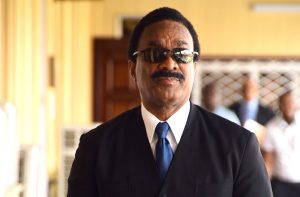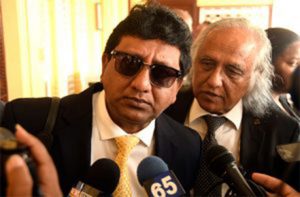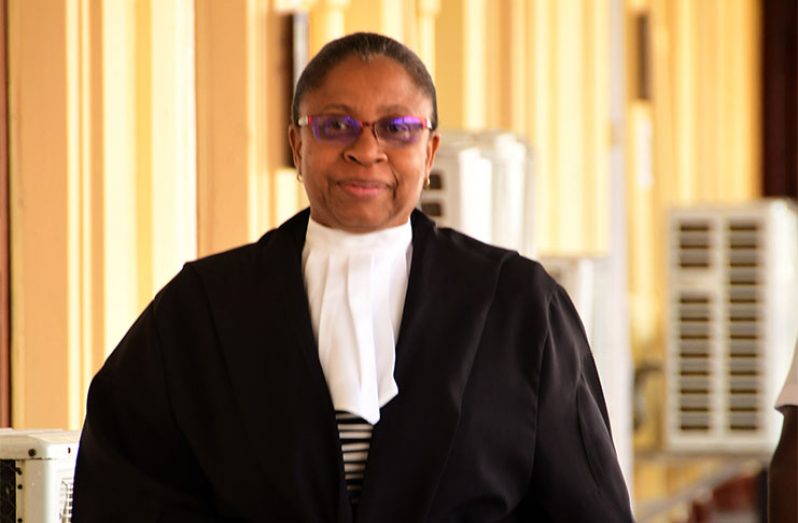…Chief Justice throws out PPP Sept 18 elections date proposal
…tells Ram you cannot “cherry pick” parts of the judgment to suit fixed views
CHIEF Justice (ag) Roxane George-Wiltshire, on Wednesday, confirmed what the Caribbean Court of Justice (CCJ) had done and what the government has been saying– that the court cannot fix a date for elections here– dealing the opposition another blow in its pursuit to force early elections.
Justice George-Wiltshire also confirmed that the CCJ did not fix a date or timeframe for the conduct of General and Regional Elections as she declined to grant an order compelling the Guyana Elections Commission (GECOM) to hold elections by September 18.
“…the CCJ could not and this Court cannot order that elections must be held by a fixed date,” Justice George-Wiltshire said as she delivered her judgement in a courtroom packed with lawyers, concerned Guyanese and journalists – a position that was argued by the Attorney- General, Basil Williams and his team.

(Photos by Adrian Narine)
The opposition People’s Progressive Party/Civic (PPP/C), through Chartered Accountant Christopher Ram, in a Fixed Date Application (FDA) had asked the High Court to compel the Chief Elections Officer (CEO) Keith Lowenfield to immediately take all steps and actions necessary and requisite to hold General and Regional Elections on or before September 18, 2019, but the Chief Justice issued no such order.
In summing up the case of Christopher Ram vs. the Chief Elections Officer, Commissioner of the National Registration, The Guyana Elections Commission and the Attorney-General, the Chief Justice said Ram, through his Attorney Anil Nandlall, relied on paragraph six (6) of the July 12, 2019 Judgment of the CCJ while the respondents relied on paragraphs six (6) and seven (7) of the same ruling, in support of their arguments.
In those two paragraphs, the CCJ, in delivering the Consequential Orders, said due to the fact that the No-Confidence Motion (NCM) was passed on December 21, 2018, and general elections should have been held by March 21, 2019 unless a two-thirds majority in the National Assembly had resolved to extend the period. However, the country’s final appellate Court also made it clear that Article 106 of the Constitution invests in the President, the National Assembly and, implicitly, GECOM, the responsibilities that impact on the precise timing of elections. The CCJ stated clearly that it was not within its remit to issue coercive orders instructing these constitutional players how to act.
Flaw in opposition application
Chief Justice George-Wiltshire, from the onset of her judgement, identified a “flaw” in the contentions of the applicant. “Nowhere in the application or the submission is there a recognition that apart from fixing a three-month period for the holding of an election after a successful NCM, Article 106 (7) also includes an important proviso that the National Assembly can extend the period for the holding of such elections,” she told the parties in the matter.
The Chief Justice, in interpreting the judgement (Consequential Orders) of the CCJ, explained that Article 106 (6) and (7) of the Constitution explicitly outline the procedures that ought to follow a successful No-Confidence Motion. She noted that the CCJ, in upholding the Constitution, said elections should have been held by March 21, 2019 unless a two-thirds majority in the National Assembly had resolved to extend that period. Justice George-Wiltshire said while the CCJ further noted that the court proceedings challenging the validity of the no-confidence vote had effectively placed the matter on pause and the clock had started back ticking on June 18 when it issued its ruling, it was not an indication that elections ought to be held within three months of that ruling.
In support of her ruling, the Chief Justice turned the Court’s attention to paragraph 9 (e) and (f) of the July 12 Consequential Orders, explaining the CCJ’s June 18 decision, immediately operationalised Article 106 of the Constitution. Notably, paragraph 9 (f) of the CCJ clearly explained that “Upon the passage of this motion of no-confidence in the Government, the clear provisions of Article 106 immediately became engaged.”
“In so becoming immediately operationalised, as regards the holding of elections, which is the foundational issue of this application, Article 106 (7) provides that such elections be held within three months of the date of the passage of the NCM or such longer period as the National Assembly shall by resolution supported by not less than two-thirds of vote of all elected members of the National Assembly shall determine. If the court had said that Article 106 immediately becomes engaged then the June 18 date or the July 12 date when the Consequential Orders judgement was made, could have been days from which the effective NCM could have been counted but this language was not used,” Justice George-Wiltshire explained.
The Chief Justice said to do the contrary would be to re-fix the date of the passage of the No-Confidence Motion, as she shut down arguments put by Nandlall that General and Regional Elections must now be held within three months of the CCJ’s June 18 ruling validating the No-Confidence Motion.
“To hold otherwise that Article 106 immediately became engaged would have resulted in the CCJ refixing the date of the NCM and reconfiguring what the Court referred to as clear provisions of Article 106 of the Constitution. The Court could not and this Court cannot refix the date of the NCM to June 18, 2019 when it was validly passed on December 21, 2018,” the Chief Justice told the parties in the matter.
She maintained that it is not within the jurisdiction of the Court to reconfigure date of the passed No-Confidence Motion. To do so, she added, would be to disregard the Rule of Law and the Constitution for which the Court is bound to uphold.

The Chief Justice was keen on pointing out that the CCJ, in issuing its consequential orders, stated that Article 106 of the Constitution placed in the hands of the President, the National Assembly and in part GECOM the responsibilities that would impact the precise time of the elections. “The CCJ, therefore, did not explicitly or by indications in its pronouncements or in the declaration in its orders in paragraph 9 (e) and (f) order that elections ought to be held within three months of June 18, 2019.
On the contrary, the CCJ explicitly stated that it is not the role of the Court to establish a date for on or by which the elections must be held. Further, the CCJ could not and this Court cannot order that elections must be held by a fixed date because of the provision that the National Assembly can decide to extend the period for the holding of elections – a provision which the applicant has failed to acknowledge in his application,” Justice George-Wiltshire ruled.
For her, the language of the court could not have been clearer. The Chief Justice said the applicant cannot “cherry pick” parts of the judgement to suit his fixed views.
Justice George-Wiltshire also ruled that the notice of application by the Attorney-General Basil Williams was correct in urging that the issue is res judicata. The Attorney-General and the Solicitor General Nigel Hawke had repeatedly argued that the issues raised in Ram’s FDA were Res Judicata for ‘Issue Estoppel’- meaning that the matter has already been settled by a judicial decision, in this case, the CCJ. As such, the Chief Justice ruled that she could not grant the order sought by Ram.
In this matter, the Chief Elections Officer was represented by Attorney-at-Law Roysdale Forde and Senior Counsel Neil Boston while GECOM was represented by Senior Counsel Stanley Marcus. The Attorney-General appeared in association with the Solicitor General while Ram was represented by Attorneys-at-Law Anil Nandlall and Ralph Ramkarran among others. The Guyana Bar Association was also represented in the case by its President Teni Housty, and Sanjeev Datadin, both of whom are attorneys.



.jpg)








